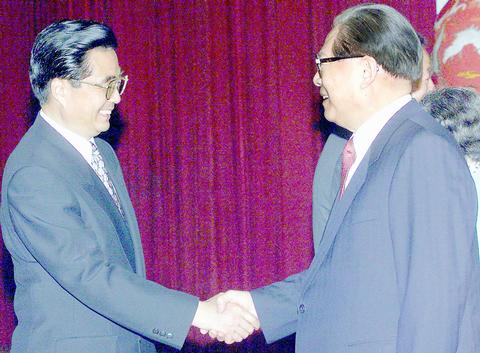China's enigmatic Vice President Hu Jintao (
The trip to Europe -- expected to include Britain, France, Germany and Spain -- is apparently designed to bolster his image at home and strengthen his position as heir-apparent to state President and Communist Party General Secretary Jiang Zemin (

PHOTO: AFP
To his European hosts, it will offer a rare glimpse of the man likely to succeed Jiang in the top jobs in China.
Jiang is due to retire as party leader at a party congress next year and as president at the annual meeting of the National People's Congress in 2003.
Hu, now ranked fifth on the seven-member Politburo Standing Committee, was anointed Jiang's successor by late paramount leader Deng Xiaoping (
But his political future is far from certain in the turbulent world of Chinese succession politics and he remains an enigma to foreign governments, as well as many Chinese officials, analysts say.
"He seems to be edging into the limelight," said one Western diplomat. "But the man is still a bit of a mystery."
Hu raised his profile domestically last month with a widely-publicized trip to Tibet to mark the 50th anniversary of Chinese rule over the Himalayan region.
State media gave blanket coverage of him vowing to crush separatists and boost the local economy in meetings with party officials, soldiers, farmers and herdsmen.
Hu's European tour will help establish his international credentials but diplomats said he must tread a fine line to avoid upstaging Jiang, who continues calling the shots by holding on to his position as head of the Central Military Commission.
One of Hu's potential rivals is Jiang's protege Zeng Qinghong (曾慶紅), head of the party's organization department, analysts say.
China has had a string of anointed heirs who never made it. Hua Guofeng (華國鋒), named successor by Mao Zedong, was toppled by Deng in the late 1970s.
Deng's first handpicked successor, Hu Yaobang (

MORE VISITORS: The Tourism Administration said that it is seeing positive prospects in its efforts to expand the tourism market in North America and Europe Taiwan has been ranked as the cheapest place in the world to travel to this year, based on a list recommended by NerdWallet. The San Francisco-based personal finance company said that Taiwan topped the list of 16 nations it chose for budget travelers because US tourists do not need visas and travelers can easily have a good meal for less than US$10. A bus ride in Taipei costs just under US$0.50, while subway rides start at US$0.60, the firm said, adding that public transportation in Taiwan is easy to navigate. The firm also called Taiwan a “food lover’s paradise,” citing inexpensive breakfast stalls

TRADE: A mandatory declaration of origin for manufactured goods bound for the US is to take effect on May 7 to block China from exploiting Taiwan’s trade channels All products manufactured in Taiwan and exported to the US must include a signed declaration of origin starting on May 7, the Bureau of Foreign Trade announced yesterday. US President Donald Trump on April 2 imposed a 32 percent tariff on imports from Taiwan, but one week later announced a 90-day pause on its implementation. However, a universal 10 percent tariff was immediately applied to most imports from around the world. On April 12, the Trump administration further exempted computers, smartphones and semiconductors from the new tariffs. In response, President William Lai’s (賴清德) administration has introduced a series of countermeasures to support affected

CROSS-STRAIT: The vast majority of Taiwanese support maintaining the ‘status quo,’ while concern is rising about Beijing’s influence operations More than eight out of 10 Taiwanese reject Beijing’s “one country, two systems” framework for cross-strait relations, according to a survey released by the Mainland Affairs Council (MAC) on Thursday. The MAC’s latest quarterly survey found that 84.4 percent of respondents opposed Beijing’s “one country, two systems” formula for handling cross-strait relations — a figure consistent with past polling. Over the past three years, opposition to the framework has remained high, ranging from a low of 83.6 percent in April 2023 to a peak of 89.6 percent in April last year. In the most recent poll, 82.5 percent also rejected China’s

PLUGGING HOLES: The amendments would bring the legislation in line with systems found in other countries such as Japan and the US, Legislator Chen Kuan-ting said Democratic Progressive Party (DPP) Legislator Chen Kuan-ting (陳冠廷) has proposed amending national security legislation amid a spate of espionage cases. Potential gaps in security vetting procedures for personnel with access to sensitive information prompted him to propose the amendments, which would introduce changes to Article 14 of the Classified National Security Information Protection Act (國家機密保護法), Chen said yesterday. The proposal, which aims to enhance interagency vetting procedures and reduce the risk of classified information leaks, would establish a comprehensive security clearance system in Taiwan, he said. The amendment would require character and loyalty checks for civil servants and intelligence personnel prior to